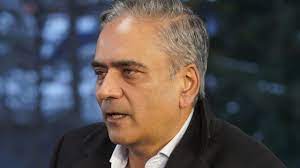NEWS
Deutsche Bank ex-CEO succumbs to cancer
Anshu Jain, the former co-chief executive of Deutsche Bank AG, died in London on Saturday after a five-year battle with duodenal cancer.
Anshu Jain, the former co-chief executive of Deutsche Bank AG, died in London on Saturday after a five-year battle with duodenal cancer.

Anshu Jain, the former co-chief executive of Deutsche Bank AG, died in London on Saturday after a five-year battle with duodenal cancer.
The first non-European to lead the German banking giant, Jain was diagnosed with duodenal cancer in January 2017. He was 59 years old, and is survived by his wife and two children.
“We are deeply saddened that our beloved husband, son, and father, Anshu Jain, passed away overnight," the family said in a release.
Jain was made co-CEO of Deutsche Bank AG in June 2012 when it was going through troubled times. He stepped down in 2015 after the bank got mired in a string of regulatory issues. The bank was accused of Libor manipulation by the regulator and faced investigations over money laundering and foreign exchange violations.
He was president of Cantor Fitzgerald since 2017, the year he was detected with cancer. He was given a year to live but outlasted this through, as his family said, "a combination of exhaustive personal research, tactical skill, amazing caregivers and sheer force of will".
“There are few reliable statistics for life expectancy for stomach cancer in the third, fourth, and fifth years, because so few people survive these milestones," the family wrote. “To his last day, Anshu stood by his lifelong determination to ‘not be a statistic.’"
Born in Rajasthan's Jaipur in 1963, he studied at the Shri Ram College of Commerce, New Delhi, and the University of Massachusetts.
The son of a civil servant, he lived in Delhi for most of his childhood and teenage years. “He met his wife Geetika when he was 17 and would collect and drop her off from university by public bus every day, because those trips were the only time when she was unsupervised by her parents. He went to the University of Massachusetts, Amherst, for his MBA, and graduated with Beta Gamma Sigma honours,” the family said.
He loved wildlife, wildlife photography, safaris in Kenya's Masaai Mara and wilderness conservation . He was also a sports buff and loved Bollywood movies.
James Davies, the current head of Deutsche's investment bank for the Americas, first met Jain playing cricket. Jain was knocked to the ground by a first ball bouncer but stood up to face the next ball. "The qualities he showed on the pitch - leadership, courage, loyalty and a fierce desire to win were the hallmarks of his attitude on the trading floor," Davies was quoted in media as saying.
Jain began his career with New York stock broker Kidder, Peabody & Co. He then moved to investment bank Merrill Lynch. He spent a large part of his career in London as an investment banker. He then followed his mentor Edson Mitchell to Deutsche Bank in 1995. He was hired to launch a division specialising in hedge funds and derivatives. He went on to head bond trading and emerging markets.
When Mitchell died in a plane crash in 2000, Jain was made head of Deutsche's global markets business. He then co-lead the investment banking division in 2004. He took sole control of the division in 2010 and out-earned the then-CEO Josef Ackermann. He helped the bank establish itself as a global financial powerhouse.
"Anshu Jain played a key role in expanding Deutsche Bank's position in our global business with companies and institutional investors. Today, this is of strategic importance not just for Deutsche Bank but for Europe as a financial centre," Deutsche Bank chair of the supervisory board Alexander Wynaendts said in a statement.
Despite earning big, he lived in a "comparatively modest" house in West London. A Jain, he was a lifelong vegetarian. His father had similar traits. When Anshu reportedly bought his father a BMW and paid a driver, his dad did not use them and instead bought a Tata Nano.
“He believed in hard work, meritocracy, operating outside of expectations or conventional boundaries, placing family first, standing by one’s roots (having turned away many attempts to Westernize him in an industry that was often homogenous), in speaking ‘at the margin’ rather than delivering plain facts, in wit and wordplay, in being nonmaterialistic, and in the importance of having broad-bandwidth and being a ‘scholar-athlete,’” his family said in a statement.
